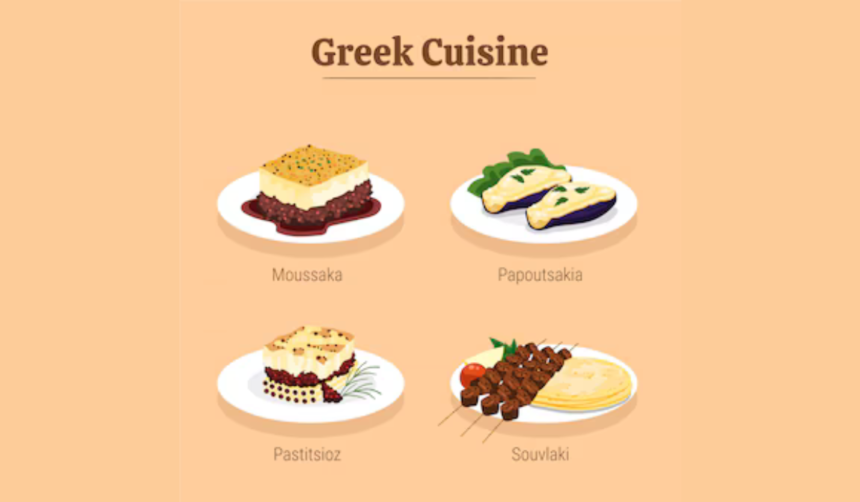Opa! Exploring the Traditions and History of Greek Cuisine
Greek cuisine is known for its rich flavors, fresh ingredients, and unique cooking techniques. From tzatziki and moussaka to baklava and souvlaki, Greek dishes are beloved around the world for their delicious taste and cultural significance. In this article, we will delve into the traditions and history of Greek cuisine, exploring the different influences that have shaped this vibrant culinary tradition.
1. A Brief History of Greek Cuisine
Greek cuisine has a long and storied history that dates back thousands of years. Influenced by the cuisine of ancient civilizations such as the Minoans, Mycenaeans, and Hellenes, Greek food has evolved over time to incorporate a wide range of ingredients and cooking techniques. From olive oil and feta cheese to honey and fresh herbs, Greek cuisine is characterized by its use of fresh, local ingredients that reflect the country’s diverse landscape.
2. The Mediterranean Diet
One of the defining features of Greek cuisine is its adherence to the Mediterranean diet, which emphasizes the consumption of fruits, vegetables, whole grains, legumes, and olive oil. This diet has been linked to a variety of health benefits, including reduced risk of heart disease, cancer, and other chronic illnesses. Greek cuisine exemplifies the principles of the Mediterranean diet, with dishes that are rich in antioxidants, vitamins, and minerals.
3. Key Ingredients in Greek Cuisine
Greek cuisine is characterized by the use of fresh, local ingredients that reflect the country’s rich agricultural traditions. Some of the key ingredients in Greek cuisine include olive oil, feta cheese, yogurt, honey, olives, garlic, and fresh herbs such as oregano, mint, and dill. These ingredients are used in a variety of dishes, from salads and dips to main courses and desserts.
4. Mezes: The Greek Tradition of Small Plates
One of the most beloved traditions in Greek cuisine is mezes, a selection of small plates that are shared among diners. Mezes can include a variety of dishes, such as tzatziki, hummus, dolmades, and grilled octopus. This tradition of sharing small plates reflects the communal nature of Greek dining, where food is meant to be enjoyed with friends and family.
5. Souvlaki: The Quintessential Greek Street Food
Souvlaki is a popular Greek street food that consists of skewered and grilled meat, typically served with pita bread, tomatoes, onions, and tzatziki sauce. Souvlaki is a quintessential Greek dish that is enjoyed by locals and tourists alike, and can be found at street vendors, tavernas, and restaurants throughout Greece. It’s a simple yet delicious dish that showcases the flavors of Greek cuisine.
6. The Importance of Olive Oil
Olive oil is a key ingredient in Greek cuisine, and plays a central role in many dishes. Known for its rich flavor and health benefits, olive oil is used in cooking, dressing salads, and drizzling over grilled meats and vegetables. Greece is one of the largest producers of olive oil in the world, with a long history of olive cultivation that dates back thousands of years.

7. Greek Desserts: Baklava and Loukoumades
Greek desserts are a sweet ending to a delicious meal, with popular options including baklava and loukoumades. Baklava is a rich and decadent pastry made with layers of phyllo dough, nuts, and honey, while loukoumades are small, deep-fried dough balls that are dipped in honey and sprinkled with cinnamon. These desserts showcase the sweet flavors and textures of Greek cuisine.
8. The Role of Wine in Greek Cuisine
Wine has been a key part of Greek cuisine for centuries, with a long tradition of winemaking that dates back to ancient times. Greece is known for producing a wide range of wines, from crisp whites to rich reds, with popular grape varietals including Assyrtiko, Xinomavro, and Agiorgitiko. Wine is often enjoyed with meals in Greece, and is an important part of the country’s culinary heritage.
9. Regional Variations in Greek Cuisine
Greek cuisine is diverse and varied, with different regions of the country having their own unique culinary traditions. For example, the island of Crete is known for its use of fresh herbs and vegetables, while the northern region of Epirus is famous for its hearty meat dishes. By exploring the regional variations in Greek cuisine, diners can gain a deeper appreciation for the country’s culinary heritage.
10. Celebrating Greek Festivals and Traditions
Greek cuisine is closely tied to the country’s rich cultural traditions and religious festivals. From Easter and Christmas to Greek Independence Day and the Feast of Saint George, these celebrations are marked with traditional dishes and customs that have been passed down through generations. By participating in these festivals, visitors can immerse themselves in the sights, sounds, and flavors of Greek culture.
11. The Influence of Byzantine and Ottoman Empires
The culinary traditions of Greece have been shaped by a variety of influences, including the Byzantine and Ottoman Empires. The Byzantine Empire introduced new ingredients and cooking techniques to Greek cuisine, while the Ottoman Empire brought flavors such as cinnamon, cloves, and nutmeg. These influences have combined to create a unique and vibrant culinary tradition that is enjoyed by people around the world.
12. Cooking Techniques in Greek Cuisine
Greek cuisine is known for its simple yet flavorful cooking techniques, which highlight the natural flavors of the ingredients. Grilling, roasting, and baking are common cooking methods in Greek cuisine, with dishes often seasoned with olive oil, lemon juice, and fresh herbs. These techniques result in dishes that are both delicious and healthy, reflecting the principles of the Mediterranean diet.
13. Dining Etiquette in Greece
Greek dining etiquette is marked by a sense of hospitality and generosity, with meals often served family-style and shared among diners. It is customary to greet hosts with a warm “Kalimera” (good morning) or “Kalispera” (good evening), and to show appreciation for the meal with an enthusiastic “Opa!” Greek dining is a social affair, with lively conversation and laughter accompanying each meal.
14. The Future of Greek Cuisine
As Greek cuisine continues to evolve and adapt to modern tastes and lifestyles, chefs and restaurateurs are finding new ways to showcase the flavors and traditions of the country’s culinary heritage. From innovative twists on classic dishes to farm-to-table dining experiences, Greek cuisine is thriving in restaurants around the world. By exploring the traditions and history of Greek cuisine, diners can gain a deeper appreciation for the flavors and culture of this vibrant culinary tradition.
15. Conclusion
Greek cuisine is a rich and diverse culinary tradition that reflects the country’s history, culture, and landscape. From the use of fresh, local ingredients to the emphasis on sharing meals with loved ones, Greek cuisine embodies the principles of hospitality, generosity, and community. By exploring the traditions and history of Greek cuisine, diners can gain a deeper appreciation for the flavors, techniques, and customs that make this culinary tradition so beloved around the world. Opa!
FAQs about “Opa! Exploring the Traditions and History of Greek Cuisine”
- What makes “Opa! Exploring the Traditions and History of Greek Cuisine” a captivating read for food enthusiasts? This book offers an immersive exploration of Greek cuisine, delving into its rich traditions, history, and cultural significance. It provides readers with a deeper understanding of the flavors, ingredients, and rituals that define Greek gastronomy.
- Which aspects of Greek cuisine’s traditions and history are covered in this book? “Opa!” covers a wide range of aspects of Greek cuisine’s traditions and history, including the influences of ancient Greek, Byzantine, Ottoman, and Mediterranean cultures, as well as the evolution of regional specialties and culinary customs.
- Are specific Greek dishes featured in this culinary exploration? Yes, this book features a curated selection of traditional Greek dishes that showcase the country’s culinary heritage. From moussaka and souvlaki to spanakopita and baklava, readers will discover the fascinating stories behind these iconic dishes.
- How does this book illuminate the cultural significance of Greek cuisine? This book illuminates the cultural significance of Greek cuisine by exploring its role in Greek society, from everyday meals to religious festivals and family gatherings. It highlights the importance of food in Greek culture as a symbol of hospitality, community, and identity.
- Can readers expect to gain insights into the historical context and influences behind Greek cuisine from this book? Absolutely! “Opa! Exploring the Traditions and History of Greek Cuisine” provides readers with insights into the historical context, cultural influences, and culinary innovations that have shaped Greek cuisine. Whether you’re a food enthusiast or a history buff, this book offers a fascinating journey through the flavors and stories of Greece’s culinary heritage.
Advantages:
- Cultural Engagement: The title “Opa! Exploring the Traditions and History of Greek Cuisine” immediately draws readers into the cultural richness of Greek cuisine, invoking the celebratory exclamation “Opa!” and promising exploration of Greek culinary traditions and history.
- Educational Value: By delving into the traditions and history of Greek cuisine, the title offers readers valuable insights into the cultural significance and historical context of Greek culinary practices, enriching their understanding of Greek food culture.
- Gastronomic Exploration: Readers can expect to embark on a culinary journey through Greece’s diverse flavors, ingredients, and cooking techniques, providing them with a comprehensive overview of the varied culinary landscape of Greece.
- Inspiration for Cooking: The title may inspire readers to experiment with Greek recipes and ingredients in their own kitchens, encouraging culinary creativity and exploration of Greek gastronomy.
- Cultural Appreciation: Through exploration of Greek culinary traditions and history, the title fosters appreciation for Greek culture and heritage, inviting readers to learn about and celebrate the unique aspects of Greek cuisine.
Disadvantages:
- Potential Oversimplification: While the title promises exploration of Greek culinary traditions and history, it may oversimplify the complexity of Greek cuisine and overlook regional variations within Greece.
- Cultural Stereotyping: Focusing solely on the celebratory exclamation “Opa!” could perpetuate stereotypes about Greek culture, potentially reducing the depth and authenticity of the exploration of Greek culinary traditions.
- Historical Inaccuracy: The title may not fully capture the nuances and intricacies of Greek culinary history, potentially presenting a simplified or incomplete narrative of the evolution of Greek cuisine.
- Limited Scope: The title may not cover every aspect of Greek culinary traditions and history in depth, potentially leaving out certain dishes or culinary practices that could provide a more comprehensive understanding.
- Audience Engagement: While the title appeals to readers interested in Greek cuisine and culture, it may not attract those seeking practical cooking tips or recipes, limiting its audience appeal.
















